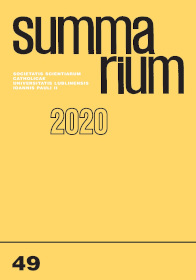Inferencjalizm semantyczny – główne idee
Semantic inferentialism: Main ideas
Author(s): Robert KublikowskiSubject(s): Philosophy, Logic
Published by: Towarzystwo Naukowe Katolickiego Uniwersytetu Lubelskiego Jana Pawła II
Summary/Abstract: This text is a revised version of the ending of the monograph written by Kublikowski (2019). I presented it at the meeting of the Department of Philosophy of the Learned Society of the Catholic University of Lublin held on 5 February 2020. During my speech, many inspiring questions or comments were made: Prof. Zenon Roskal (KUL) – What problems are associated with inferentialism? Who noticed these problems: Brandom or the speaker? What's new here? What did Brandom contribute, and what was contributed by the speaker? Does the speaker agree with Brandom or he criticizes him? In what aspect(s) does he agree and what does he criticize? Does Brandom allude to Keith Donnellan's distinction regarding a referential and attributive use of definite descriptions? Dr Piotr Biłgorajski (KUL) – In inferentialism, an important role is played by the distinction: representationism vs anti-representationism. Inferentialism is classified as anti-representationism. Prof. KUL Anna Kawalec – What distinguishes mankind? How did we achieve success (linguistic and cognitive, etc.)? Through evolution? What is the difference between an inferential network and abduction? Dr Stanisław Majdański (KUL) – A commentary on the distinction: formality versus generality, universality or "rule-based" character (the detachment rule, etc.). Prof. KUL Zbigniew Wróblewski – Does an obligation always involve an entitlement?
Journal: Summarium
- Issue Year: 2020
- Issue No: 69
- Page Range: 19-30
- Page Count: 12
- Language: Polish

